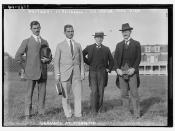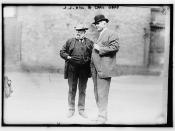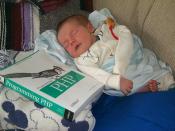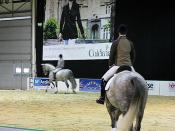Snow Falling on Cedars This story begins with Kabuo Miyamoto who is a Japanese American that fought in WWII, who is going on trial for Carl Heine, a local well liked fishermen also a WWII veteran. Kabou was convicted of the murder of Carl Heine. Art Moran, the sheriff testified that Heine's boat was found drifting on the morning of September 16. Art and his deputy, Abel, found his body entangled in a net. They also testified that they found batteries that may have come from Kabuo's boat. Horace Whaley also testified, he said he found a watch on Carl's body it stopped at one forty-seven. He also concluded with his investigations that the wound looked much like the Japanese art of kendo.
Hatsue's parents sent her to Mrs. Shiemura when she was fourteen to be trained to act lady like. She told Hastue to avoid white men because they were after her to take advantage of her.
She told her to stay inside her race, and that if she went outside she would not have appreciated it.
During the war, the Japanese were sent to interment camps. Hatsue got married with Kabou at the Manazar internment camp. They had their marriage behind a curtain room, where they turned the radio on high to avoid further trouble. Kabou ask Hatsue if she was a virgin or if she had ever kissed anybody. Hatsue denied even though she had a relationship with Ishmael. Later Kabou left, to go fight in the war against the Japanese.
Carl's father, Carl senior, agreed to sell seven acres of his land to Kabou's father, Zenhichi. Zenhichi was not an American citizen and only Japanese citizens could own land, but Carl senior still agreed. However, Carl's mother, Etta opposed she was against the Japanese and showed prejudice towards them because of the war. After Carl senior died in 1944, Etta sold her farm to Ole Jurgensen. It belonged to Kabou and his family because they worked hard to pay for it. Kabou couldn't do anything about it because, it was illegal in the first place. When Ole put his land out for sale, Kabou went to see if he would sell it to him, but he had already sold it to Carl Heine.
Many of the Japanese were arrested and sent to internment camps because of various reasons. The truth was they were just looking for an excuse to send them to the camps. The day before Hatsue left, she and Ishmael met again under the cedar tree they would always meet at as they were growing up. Ishmael asked Hatsue to marry him, but she refused because she did not want to disappoint her parents.
Hatsue's mother also felt that white men would only hurt her daughters. One day on the train ride to the camp Hatsue received a letter from Ishmael. Her sister opened it first, and then showed it to her mom. Hatsue's mom confronted her about it. Hatsue told her that she knew it was wrong from the beginning. She wrote Ishmael a letter turning him down and telling him that the relationship wouldn't work out. When Ishmael receives the letter, he gets his arm amputated at the same time. Ishmael is extremely upset and says Hatsue is also responsible for his physical pain and not just the emotional pain.
In the trial, Dr. Sterling Whitman testifies that the type of blood on Kabou's fishing gaff, which was said to have been used to kill Carl, had the blood type B positive which was also the type of blood Carl had. Next, Kabou's army sergeant Maples testifies. He stated that Kabou was highly skilled in the Japanese art of kendo. Kabou learned kendo when he was growing up, and he perfected it. Maples said that Kabou could have easily knocked over any man. The next person to testify was Carl's wife. She stated that Carl and Kabou had a conversation, but she was not present to know what they discussed. She told the jury that Carl said Kabou was trying to purchase their land, and Carl didn't turn Kabou down completely.
Later, Hatsue asked Ishmael to write an article that proves Kabou innocent. At first Ishmael hesitates but he does write an article. Besides that, he also finds evidence that proves Kabou to have not murdered Carl. He finds the radio transmission of the night of Carl's death. It shows that there was another ship that came through right before Carl's death. He found that the S.S. West Corona created large enough waves to cause a man on a small boat to go over board. He later gives this information to Hatsue and her family.
In future testimonies, it shows plenty of evidence to show that Kabou is innocent. The truth of what happened was testified by Kabou. He said that he went on the ship because Carl sent an emergency signal out. He went to help Carl, because he had a dead battery and it was part of the gill-netter association. The records Ishmael found were then heard and investigated, the closing arguments were made, and Kabou was found innocent.
The author of this book is David Guterson. Guterson was born in Seattle in 1956. Guterson received his M.A. from the University of Washington, where he studied under the writer Charles Johnson. It was from here that he discovered what he would go on to write about. Guterson wanted to concentrate on issues that can help others, and also issues he was interested in. Later, David Guterson moved to Bainbridge Island in Puget Sound. He taught English at a local high school. Also, he began writing for Sports Illustrated and Harper's magazine, where he is now one of the editors. This was the foundation of his writing career. Now he has written a number of books including, The Country Ahead of Us, the Country Behind, East of the Mountains, Family Matters: Why Home schooling Makes Sense, and of course Snow Falling on Cedars.
Snow Falling on Cedars won many awards. Such as, the 1995 PEN/Faulkner Award for fiction, the Barnes & Noble Great New Writers Award, the Pacific Northwest Booksellers Association Book Award, and the American Booksellers Book of the Year (ABBY) award. Not to mention, that it spent a year on the national best-seller lists. It also is now world known; it has sold over 3 million copies in 25 different languages.
In this story, the theme of movement is greatly seen. The book focuses on life after WWII and the Pearl Harbor attack. The Japanese went through many hard ships. Their movement from their motherland was the beginning of the harsh times for them. When the Japanese immigrated to The United States specifically San Piedro they lived in harmony with their Anglo neighbors. San Piedro, is a fictional island north of Puget Sound, Washington. This location is perfect setting for this story and also ties to the theme of the title, the snow. Washington, is in the Pacific northwestern part of the United States. The weather is usually cold, but varies. The Japanese were a minority in the time of this books setting, but they made up the population of Washington, as well as the United States in general. In San Piedro, the Japanese first began to work in the Port Jefferson lumber mill. The lumber mill served as a place to produce goods, which were also exported to other areas. About 50 years later, the lumber mill closed, and they began working on strawberry farms. Some worked on their own land and others as sharecroppers. This was also a major good produced in Washington. However, the only people that were allowed to own land were the citizens. The law also forbade naturalizing citizens to be qualified to own land. This also ties into the theme of place. The laws and rules, vary from place to place in the world. Also, the characters in this story were fishermen, this shows the major economic industry of Washington.
In Snow Falling on Cedars, The character Ishmael portrays many characteristics. Ishmael is a newspaper writer, who follows in the footsteps of his father. His father was a great writer, he would set good examples for Ishmael. Ishmael would also see what his father once saw, racism. Ishmael would try to be fair, and not judge people because of their descent. This shows Ishmael is just and unprejudiced. Ishmael was also in love with a Japanese woman, so there is no doubt that he has a problem with the Japanese. The relationship he has with Hatsue shows many aspects of his personality. Ishmael is a man who is extremely dynamic. For example, he made the first move on Hatsue at only the age of ten. Although they kissed many times after that, Hatsue didn't always agree, she always had doubt. However, she lost her virginity to him. If Hatsue was determined not to break her parents trust she would not have took that action in the first place. Ishmael was strong and he made Hatsue loose her determination. Later when the story evolves, Ishmael's heart is broken with the letter he receives from Hatsue ending the relationship by rejecting his marriage proposal. He directs his heart break towards racism, even though it truly was. He uses vulgar language, and begins a harsh hatred towards the "Jap" and particularly, Hatsue. However, this proves his weakness of being intensely unstable emotionally. Further on, Ishmael is asked by Hatsue to write an editorial addressing the role racism has played in her husband's trial. Ishmael still holds a grudge towards Hatsue and refuses. Yet he ends up writing the editorial and also finds new information that proves Kabou innocent. He is reluctant to tell Hatsue this information, but he reveals this information to her. This in turn, causes the trial to end and Kabou is proven innocent. This shows the other side of Ishmael, his compassionate side. He is caring and although he still feels heartbreak he doesn't let it come between him saving a man's life. Throughout this story, Ishmael reveals a tremendous amount of his personality. Ishmael's role in this book is crucial, otherwise it would change the book completely.
I enjoyed this book deeply, for many reasons. This story can appeal to various audiences. For example, it is mystery, romance, and historical. What ever genre one prefers, this book will suit mostly everybody. I like this book because it shows what happened to the Japanese in those days. Racism was present, and severe. When relating to the events of September 11, this teaches us a great amount. It shows us that we have improved as Americans, and our racism has lowered. By reflecting on this book, I sense repetition to some degree. Hopefully, this will not occur and Americans will learn from the past, and not have prejudice towards the Muslims. In the end, all was well, and the Japanese have begun to recover. I enjoyed this book, and I greatly recommend it to other people.





